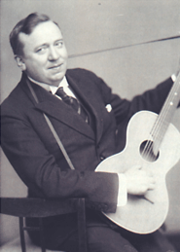
Swedish ballad tradition
Encyclopedia

Ballad
A ballad is a form of verse, often a narrative set to music. Ballads were particularly characteristic of British and Irish popular poetry and song from the later medieval period until the 19th century and used extensively across Europe and later the Americas, Australia and North Africa. Many...
tradition had been initiated by Bellman
Carl Michael Bellman
was a Swedish poet and composer. Bellman is a central figure in the Swedish song tradition and remains a very important influence in Swedish music, as well as in Scandinavian literature in general, to this day....
in the late 18th century. In the 19th century, poetic sing-songwriting fell in decline in favour of the academical student choirs, until it was again revived in the 1890s. Poets increasingly continued the tradition of having their poetry put to music to give it a wider audience. In the early 1900s, a lot of poetry of the 90s poets Gustaf Fröding
Gustaf Fröding
Gustaf Fröding was a Swedish poet and writer, born in Alster outside Karlstad in Värmland. The family moved to Kristinehamn in the year 1867. He later studied at Uppsala University and worked as a journalist in Karlstad....
and Erik Axel Karlfeldt
Erik Axel Karlfeldt
Erik Axel Karlfeldt was a Swedish poet whose highly symbolist poetry masquerading as regionalism was popular and won him the Nobel Prize in Literature posthumously in 1931. It has been rumored that he had been offered, but declined, the award already in 1919.Karlfeldt was born into a farmer's...
had been put to music, and the popularity of those poets largely depended on the troubadours.
Birger Sjöberg
Birger Sjöberg
Birger Sjöberg was a modern Swedish poet and songwriter.Originally a journalist, Sjöberg wrote songs in his spare time. His first collection Frida's Book was extremely popular...
(1885–1929) was one of the early popular troubadours. Sjöberg published the poetry collection Frida's Book (Fridas bok, 1922), a light and humorous story of the young Frida. In 1926, he reinvented himself with Kriser och kransar (Crises and garlands), a much darker collection of poetry. It is regarded as the foremost collection of Swedish poetry of the 1920s.
The arguably most renowned Swedish troubadour of the 20th century was however Evert Taube
Evert Taube
Evert Axel Taube was a Swedish author, artist, composer and singer. He is best known for his folk songs, and is widely regarded as one of Sweden's most respected musicians.-Biography:...
(1890–1976). He established himself as a performing artist in 1920 and toured Sweden for about three decades. He is best known for songs about sailors; ballads about Argentinian; and songs about the Swedish nature.
A poet who has known for songs is Nils Ferlin
Nils Ferlin
was a Swedish poet.Nils Ferlin was born in Karlstad, Värmland, where his father worked at the Nya Wermlands-Tidningen newspaper. In 1908 the family moved to Filipstad and Nils' father started his own paper...
(1898–1961) who published six collection of poetry between 1930 and 1957. Ferlin wrote melancholic but with a stinging irony. Many of his poets were put to music by friends and colleagues.
Between 1962 up until his death, the highest regarded singer-songwriter
Singer-songwriter
Singer-songwriters are musicians who write, compose and sing their own musical material including lyrics and melodies. As opposed to contemporary popular music singers who write their own songs, the term singer-songwriter describes a distinct form of artistry, closely associated with the...
in the Swedish ballad tradition was Cornelis Vreeswijk
Cornelis Vreeswijk
Cornelis Vreeswijk , was a singer-songwriter, poet and actor born in IJmuiden in the Netherlands.He emigrated to Sweden with his parents in 1949 at the age of twelve. He was educated as a social worker and hoped to become a journalist, but became increasingly involved in music, performing at...
(1937–1987). His song were initially leftist protest song
Protest song
A protest song is a song which is associated with a movement for social change and hence part of the broader category of topical songs . It may be folk, classical, or commercial in genre...
s where he took upon him to speak for the weaker men of society. After his death, Vreeswijk also gained appreciation for his poetic qualities.
Perhaps the best-known contemporary troubadour is Lars Winnerbäck
Lars Winnerbäck
Lars Mattias Winnerbäck , is a Swedish singer and songwriter. He was born in Stockholm, but spent his childhood in Linköping, where he attended Katedralskolan. He moved back to Stockholm in 1996, the same year he released his first album, Dans med svåra steg...
, whose folk-rock ballads, often infused with a poetic quality, mix a Christian socialist political message with a typically Swedish sensitivity to nature in the spirit of Vreeswijk, making him one of Sweden's most popular currently active musicians.

